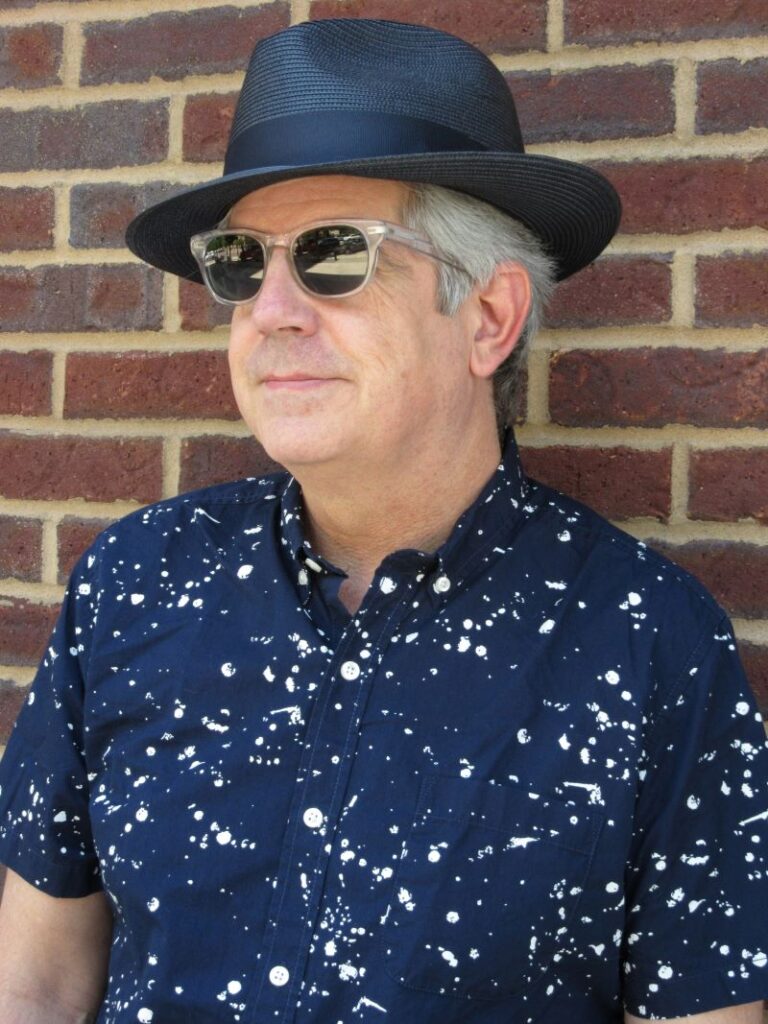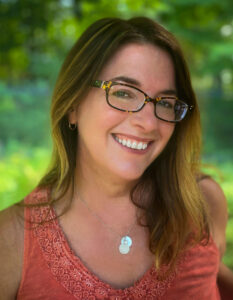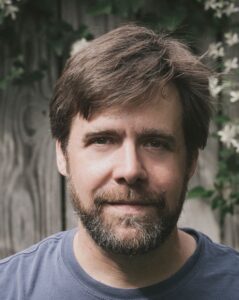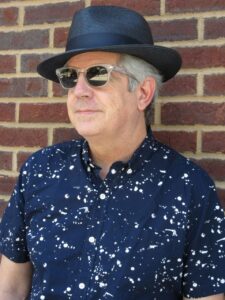 Michael Martone’s new books are Plain Air: Sketches from Winesburg, Indiana (2022); The Complete Writings of Art Smith, The Bird Boy of Fort Wayne, Edited by Michael Martone (2020) and Brooding: Arias, Choruses, Lullabies, Follies, Dirges, and a Duet (2018). Having taught creative writing for forty years at Iowa State University, Harvard University, Syracuse University, the University of Alabama, and Warren Wilson College, he retired in 2020. Martone was born and grew up in Fort Wayne. He attended Butler University, IPFW, and graduated from Indiana University. He holds the MA from Johns Hopkins University.
Michael Martone’s new books are Plain Air: Sketches from Winesburg, Indiana (2022); The Complete Writings of Art Smith, The Bird Boy of Fort Wayne, Edited by Michael Martone (2020) and Brooding: Arias, Choruses, Lullabies, Follies, Dirges, and a Duet (2018). Having taught creative writing for forty years at Iowa State University, Harvard University, Syracuse University, the University of Alabama, and Warren Wilson College, he retired in 2020. Martone was born and grew up in Fort Wayne. He attended Butler University, IPFW, and graduated from Indiana University. He holds the MA from Johns Hopkins University.
Martone won two Fellowships from the NEA and a grant from the Ingram Merrill Foundation. In 2013 he received the national Indiana Authors Award and in 2016, the Mark Twain Award for Distinguished Contribution to Midwestern Literature. His stories and essays have appeared in over 100 magazines and journals. He lives and writes for now below The Bug Line in Tuscaloosa.
Michael will be leading the sessions “Defamiliarization” and “Bad Writing Workshop,” and participate in the panel “Curiosity and Obsession in Fiction, Poetry, and Nonfiction.” He is also on the manuscript evaluation team.
Q&A with Michael Martone
Michael Martone took me to school on approaching our writing with a new sort of mindset: unlearn. Turn off the advice and “best practices;” learn to read well and engage, sort through your senses, trust your words.
MWW: What is some writing advice you give to your students that you wish you did more of in your own work?
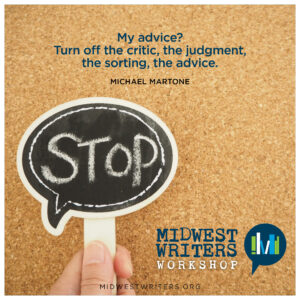 MM: It might sound strange here, but I got out of the “advice” business a long time ago. When I started teaching in the 1980s, I can remember a “student” who brought in a story, a fan fiction of Gundam Wing. I remember saying, “This is all very nice, Robert, but have you read Chekhov?” Since that time, I have evolved to never advising a “student” as to what one “should” do with one’s work. I really no longer think of my “students” as students. We are all writers in a room. It is my job to enter into the texts that are shared with curiosity and be helpful when I can with other writers’ work where they ask for help. I no longer prescribe but I do describe. I try to give back to the writer an accurate description of what I am reading, how what I am reading is making me feel, think. There are plenty of critics in the world who will tell you what you did wrong. I am not one of them. But I am not one who says what you did is right either. It is not my story or poem. I think I can give a reading of a work without having an “ax to grind” (just think of that metaphor for a bit). My advice to writers and artists is not to have opinions of others but to be good, attentive, curious readers and enter into sympathetic, attentive conversations with your peers. The writing classroom is not like the regular classroom. I don’t know a thing about calculus. I must go to school and find a teacher who will transfer the calculus to me. On the other hand, making stories, poems, art is not like that kind of knowledge. The artist brings one’s own “calculus” to class. So, to answer your question—my advice? Turn off the critic, the judgment, the sorting, the advice.
MM: It might sound strange here, but I got out of the “advice” business a long time ago. When I started teaching in the 1980s, I can remember a “student” who brought in a story, a fan fiction of Gundam Wing. I remember saying, “This is all very nice, Robert, but have you read Chekhov?” Since that time, I have evolved to never advising a “student” as to what one “should” do with one’s work. I really no longer think of my “students” as students. We are all writers in a room. It is my job to enter into the texts that are shared with curiosity and be helpful when I can with other writers’ work where they ask for help. I no longer prescribe but I do describe. I try to give back to the writer an accurate description of what I am reading, how what I am reading is making me feel, think. There are plenty of critics in the world who will tell you what you did wrong. I am not one of them. But I am not one who says what you did is right either. It is not my story or poem. I think I can give a reading of a work without having an “ax to grind” (just think of that metaphor for a bit). My advice to writers and artists is not to have opinions of others but to be good, attentive, curious readers and enter into sympathetic, attentive conversations with your peers. The writing classroom is not like the regular classroom. I don’t know a thing about calculus. I must go to school and find a teacher who will transfer the calculus to me. On the other hand, making stories, poems, art is not like that kind of knowledge. The artist brings one’s own “calculus” to class. So, to answer your question—my advice? Turn off the critic, the judgment, the sorting, the advice.
MWW: In bad writing, is there a point at which we have to admit, “Yup, this is bad—irredeemably bad—and scrap it? Have you ever created a piece of bad writing that wasn’t worth the time and effort to improve?
MM: You might gather from the answer above that my feelings about good and bad writing are complicated and not binary at all. Your question comes, of course, from the session I will lead on “Bad” writing. Without giving too much away (sign up for the class—it will be Good? Bad?), I hope to have us all go existential. We use terms like “good” and “bad” all the time, but do we really know what we mean by good writing or bad writing? Often it is reduced to a set of rules a writer lives by (I am looking at you Strunk & White!) and the breaking of those rules, conventions, or the not following the advice of experts is evidence of badness. I predict now that no one in the session on Bad Writing will be able to produce bad writing! But we will see. Perhaps there is a bad writer out there who is actually able to be bad.
MWW: In Bird by Bird, Anne Lamott says “Writing is about learning to pay attention and to communicate what is going on.” This sounds like it ties into the session you’re teaching. What are some of the things you encourage students to pay attention to as fodder for the page?
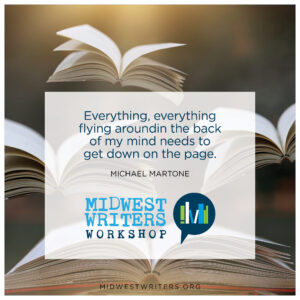 MM: Again, I am not so much going to give advice: Look at that! Or see this! Or have you ever noticed! I like to use the class to pay attention to how each of us filters out the world. We have to use filters, biological screens to select this bit of information from this one or we would be overwhelmed by the incoming stimulation, overwhelmed by the senses. So, my focus is on the editors in us all that we depend upon in ordinary life but that get in the way when you are making your art. It is about seeing again how we sort out what we see. It is about unlearning. Years ago, the writer Grace Paley told me, when I asked her what one should do as a teacher, “Make your students dumb again.” Un-learn them. To “notice” is not just to notice but also notice how to not notice. Or as Donald Barthelme says in “The Art of Not Knowing,” Art is not difficult because it wishes to be difficult, but because it wishes to be art.
MM: Again, I am not so much going to give advice: Look at that! Or see this! Or have you ever noticed! I like to use the class to pay attention to how each of us filters out the world. We have to use filters, biological screens to select this bit of information from this one or we would be overwhelmed by the incoming stimulation, overwhelmed by the senses. So, my focus is on the editors in us all that we depend upon in ordinary life but that get in the way when you are making your art. It is about seeing again how we sort out what we see. It is about unlearning. Years ago, the writer Grace Paley told me, when I asked her what one should do as a teacher, “Make your students dumb again.” Un-learn them. To “notice” is not just to notice but also notice how to not notice. Or as Donald Barthelme says in “The Art of Not Knowing,” Art is not difficult because it wishes to be difficult, but because it wishes to be art.
MWW: At what point do you realize that the thing flying around in the back of your mind, or an observation that you’ve made, is actually the inkling of an idea that you need to get down on the page?
MM: My short answer is, well, I don’t. Back to my evolution. I think I once was a writer all about “best word in best order.” But now, 40 years later on, I think I am more a “first word best word” kind of writer. All your questions worry the part of writing that is the critic, the editor, the reviser all in service to making a work “work.” I like those two words you use— “flying” and “inkling.” I am all for the flying about now, the speed, the spontaneity, the mistakes are successes, the accidents. Lots of little inks–inklings–instead of the big perfect splash. And remember, I am trying to switch off the editor at the switch. Everything, everything flying around in the back of my mind needs to get down on the page.
Stay tuned! We’ve got more Q&As with our all-star faculty members.
They will help you write your story!
EXCITING NEWS!
Midwest Writers Workshop will award a limited number of scholarships for participation in the IN-PERSON conference. Apply Here.
We’re proud to present MWW50th Homecoming Day: Writing Matters, a FREE one-day writing event featuring workshops and panels with our alumni. Learn more and register here.
MWW is dedicated to building a community where writers can network with others and grow.

